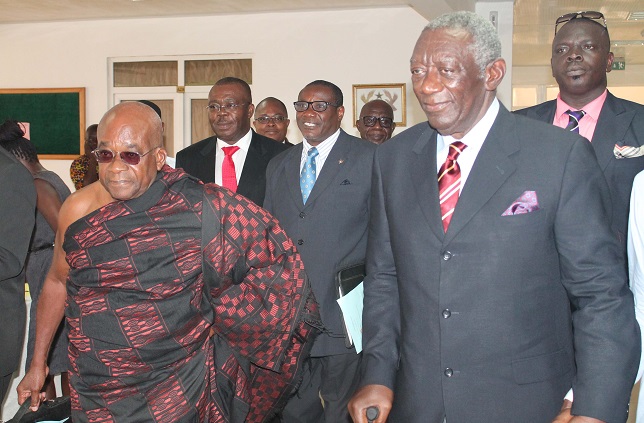
Gimpa starts international relations programme at master’s degree level
Former President John Agyekum Kufuor has asked students of International Relations (IR) in Ghana to be abreast of the geopolitics of the world to remain relevant in the ever-changing dynamics of public administration.
He stated that gone were the days when governance was treated as a single entity standing on its own, without recourse to the happenings of globalisation.
Diplomacy key in governance
Mr Kufuor, who made the call at the inauguration of a special Master of Arts programme in International Relations and Diplomacy at the Ghana Institute of Management and Public Administration (GIMPA) in Accra yesterday, underscored the fact that IR and Diplomacy had a knock-on effect on all sectors of governance.
The new programme is designed to provide an academic and professional programme of study to contribute to capacity building for the relevant ministries and departments, as well as international organisations in Ghana and the West African sub-region.
It was for that reason that the former President, in his address, described the introduction of the programme as a very significant part of the governance system of the world which was holistic and integrated in every sphere of public administration.
While congratulating GIMPA on introducing the programme, Mr Kufuor advised the pioneering students of the programme, which commenced in October 2016, to be minded about the concept of good negotiation skills which, he pointed out, were crucial in IR.
He described GIMPA as an institution destined for greatness and urged its management to continue introducing edifying courses to enhance the knowledge of the Ghanaian public in the relevant areas of public administration.
Admission requirements
Students admitted to the master’s programme will undergo a study period of four consecutive semesters for two years full time, depending on a student’s background and experience.
Requirements for admission are a good bachelor’s degree or equivalent professional qualification from a recognised professional institute and the presentation of a plan from applicants specifying how they intend to apply the newly acquired skills and knowledge in solving workplace problems.
A selection interview also forms part of the admission criteria.
The School of Public Service and Governance of GIMPA is hosting the IR and Diplomacy programme.
Programme objective
Earlier in his remarks, the Rector of GIMPA, Professor Philip Ebow Bondzie-Simpson, said the two-year programme was specially designed to equip students with the knowledge, attitude and conceptual tools to analyse transnational issues and manage real world organisations.
He explained that the programme adopted an inter-disciplinary approach to provide students with a strong academic foundation and professional skills for excellence, achievement and leadership in a highly complex and multi-polar world.
Prof. Bondzie-Simpson indicated that the programme reinforced GIMPA’s commitment to provide quality programmes in a participant-centred learning climate to enable the school to contribute to human capacity development.
The rector made it known that GIMPA was developing a four-year Doctor of Philosophy programme in IR and Diplomacy and also developing double master’s degrees with existing disciplines in the institute, including master’s in International Affairs and International Law and master’s in International Affairs and Communications Technology.
A Deputy Minister of Foreign Affairs and Regional Integration, Mr Charles Owiredu, described the programme as a positive move to enhance the skills and capacities of students and practitioners of IR and Diplomacy.
He said the government was focused on economic diplomacy, with the view to prioritising development and economic opportunities to attract foreign direct investments and promote the tourism potential of the country.
History of IR
The history of IR based on sovereign states is often traced back to the Peace of Westphalia of 1648, a stepping stone in the development of the modern state system. Prior to that, the European medieval organisation of political authority was based on a vaguely hierarchical religious order.
It is a distinct field of study which began in Britain and emerged as a formal academic discipline in 1919 with the founding of the first IR professorship.
The Walsh School of Foreign Service is the oldest IR faculty in the United States, founded in 1919.
In the early 1920s, the London School of Economics Department of International Relations was founded at the behest of the Nobel Peace Prize winner, Philip Noel-Baker. It is the first institute to offer a wide range of degrees in the field.
Writer’s email:
